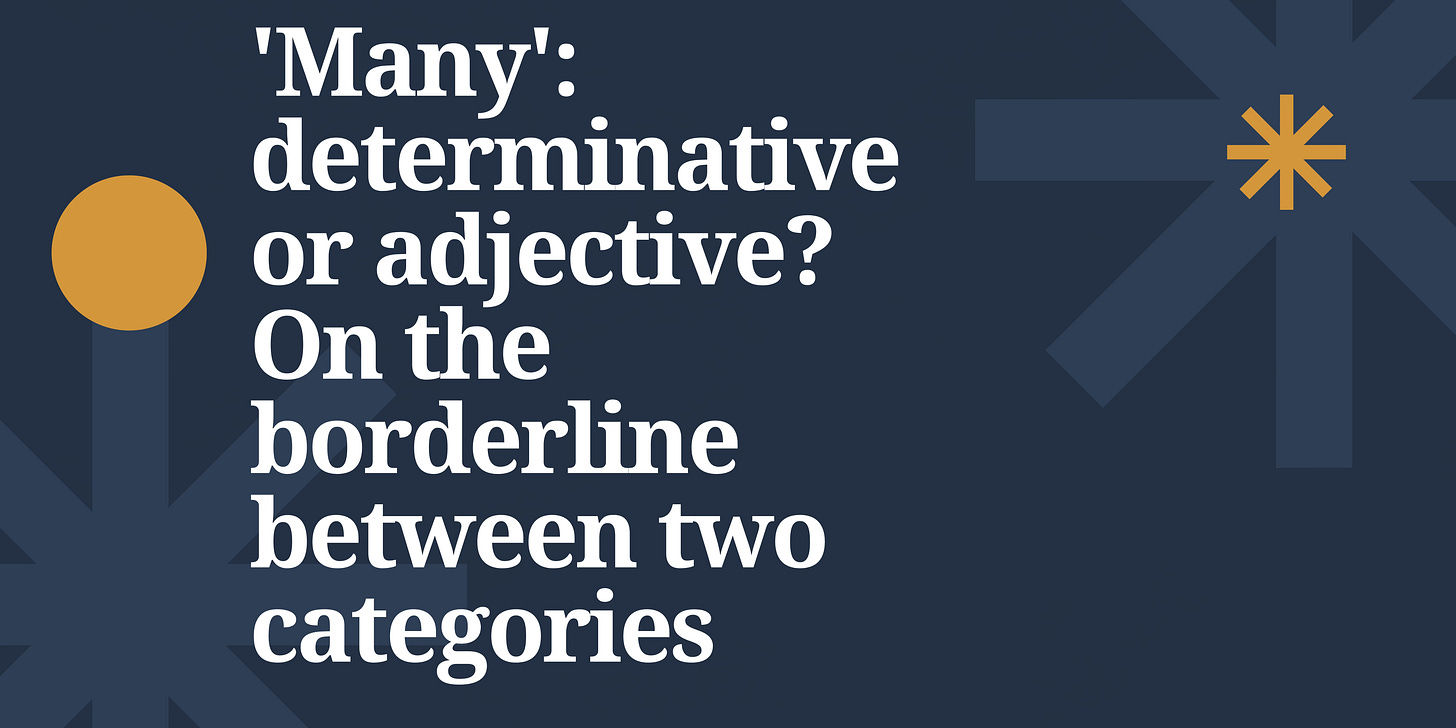'Many': determinative or adjective?
On the borderline between two categories
Which word class does the lexical item many belong to?
Your hunch might be to say that it belongs to the class of determinatives. After all, the meaning that's expressed by a word like many, when combined with a noun, is not a descriptive meaning. When we say, for example, many books, it seems that we're not ascribing a property to the referent of the noun books in the way that the adjective heavy does in the noun phrase heavy books. The meaning expressed by many is ‘a large number’, and this is a meaning typically expressed by determinatives, which have a specifying function, not by adjectives. Compare many with those in those books, where the determinative those expresses ‘definiteness’ and ‘plurality’, but not a property or attribute.
But what about the syntax of many? It is an interesting lexical item, because it displays determinative-like properties and adjective-like properties. I will, however, argue that the adjective-like properties outweigh the determinative-like properties, and that many is best regarded as an adjective.
But let’s not jump the gun, and first see how the big reference grammars of English treat the lexical item many.
Quirk et al.’s Comprehensive Grammar of the English Language (1985: 253f.) recognises three positional subgroups of determiners:1
predeterminers: all, both, half, double, one third, one fifth…
central determiners: a, the, this, these, that, those, every, each, my, his, her…
postdeterminers: same, last, next, many, (a) few, three, four…
As you can see, many is regarded as a postdeterminer. In the noun phrase all the many issues we see an instance of a determiner from each of the three subgroups placed before the noun issues.
In Huddleston and Pullum's Cambridge Grammar of the English Language the word many is treated as a determinative (2002: 393-4). It can function either as a Determiner in this example:
[NP Many issues] were discussed.
or as a Modifier, as in:
[NP The many issues that were discussed] were complicated.
Notice that in the second example we have two determinatives (the and many), with different grammatical functions.
But is many really a determiner (as in Quirk et al.) or determinative (as in Huddleston and Pullum)?
Recall from my earlier post on parsing that we assign a word to a word class on the basis of the company that it keeps. So we look at how a word behaves grammatically with regard to other items around it. In other words, we look at its syntactic distribution.
We find that the word many actually displays quite a few adjective-like properties.
First, it can take comparative and superlative forms:
many books – more books – most books
To deal with this, Huddleston and Pullum (2002: ibid.) exceptionally have to recognise a class of degree determinatives containing just four items, namely many, much, few and little.
Does many display any other adjective-like properties?
Yes, it does. Notice that we can say:
He has very many talents.
Being able to be preceded by an intensifier adverb like very or extremely is typically a property of adjectives and adverbs, not determinatives.
Next, a classical test for adjectivehood is to place an item after be, seem or become (Huddleston and Pullum 2002: 530). Many passes the test. We can say:
His talents are (very) many.
or:
Four talents might not seem (very) many.
or:
His intitially few talents soon became (very) many.
Finally, many can appear in a syntactically odd position in English, namely before the determinative a, as in:
Many an interesting issue was discussed at the meeting.
Adjectives can appear here too, as in:
Human resources is so important a part of any organisation.
In addition to adjectives, a few other items can appear before a in this way. Among them is what in an exclamative clause like:
What an interesting issue you raise!
It’s a strange construction, and it’s not at all obvious which word class what belongs to here. Quirk et al. regard it as a predeterminer, but for Huddleston and Pullum (2002: 919) it is an adjective! So, we might ask, if what is an adjective in what an interesting issue, why is it not an adjective in many an interesting issue?
In conclusion, there’s plenty of syntactic evidence for regarding many as an adjective, not as a determinative.
We see that grammarians have fun collegially wrangling over a common word like many, which poses a fascinating puzzle.
More syntactic brainteasers to come!
References
Huddleston, Rodney and Geoffrey Pullum (2002) The Cambridge Grammar of the English Language. Cambridge: Cambridge University Press.
Quirk, Randolph, Sidney Greenbaum, Geoffrey Leech and Jan Svartvik (1985) A Comprehensive Grammar of the English Language. London: Longman.
Recall from my earlier post "What the hell is a determiner?” that Quirk et al. use determiner as a word class label and determinative as a function label. But here I follow Huddleston and Pullum in doing it the other way round: determinative is a category label, whereas Determiner is a function label. (And just additionally to remind you: I spell grammatical function labels with a capital letter.)




My faourite bit of data on this topic is that adjectives can be iterated, but determinatives can't: 'bule, blue eyes', 'many, many times' but not *'the, the apple'!
Anyone intererested in this topic might want to have a look at Mariangela Spinillo's brilliant and very readable UCL thesis: "Reconceptualising the English determiner class". Available here: https://discovery.ucl.ac.uk/id/eprint/10101595/1/out.pdf